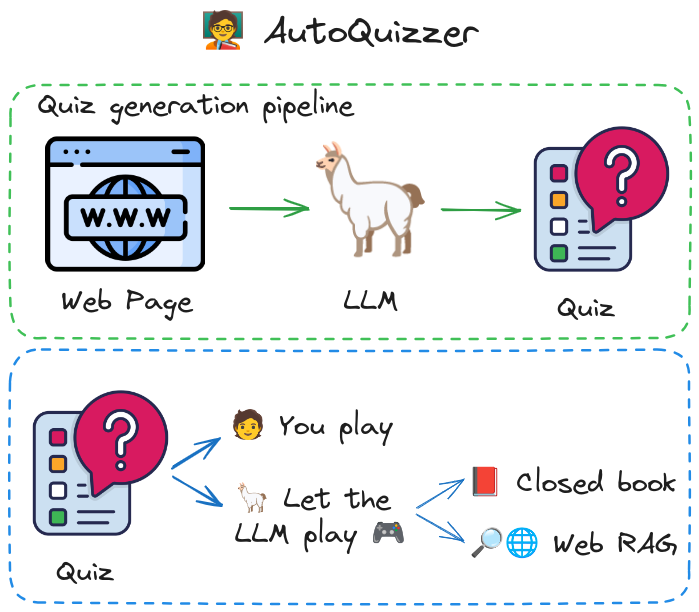Spaces:
Running
Running
metadata
title: AutoQuizzer
emoji: 🧑🏫
colorFrom: purple
colorTo: blue
sdk: gradio
sdk_version: 4.31.1
app_file: app.py
header: mini
pinned: true
models:
- meta-llama/Meta-Llama-3-8B-Instruct
🧑🏫 AutoQuizzer 
Generates a quiz from a URL. You can play the quiz, or let the LLM play it.
Built using: 🏗️ Haystack • 🦙 Llama 3 8B Instruct • ⚡ Groq
How does it work?
- Quiz generation Pipeline: downloads HTML content from the URL, extracts the text and passes it to Llama 3 to generate a quiz in JSON format.
- You can play the quiz and get a score.
- You can let Llama 3 play the quiz:
- closed book answer Pipeline: the LLM is provided given the general quiz topic and questions. It can answer the questions based on its parametric knowledge and reasoning abilities.
- Web RAG answer Pipeline: for each question, a Google search is performed and the top 3 snippets are included in the prompt for the LLM.
How to run it locally?
- Clone the repo:
git clone https://github.com/anakin87/autoquizzer - Install:
cd autoquizzer && pip install -r requirements.txt - Export two environment variables:
GROQ_API_KEY: API key for the Groq API, used to serve Llama 3.SERPERDEV_API_KEY: API key for the SerperDev API, used to fetch search results.
- Run the webapp:
gradio app.py
Customization and potential improvements
- We are using the
OpenAIGeneratorto query Llama 3 on Groq. You can use an OpenAI model with the same generator. You can also use a different generator (Haystack generators). - In the quiz generation pipeline, we ask the model to generate a JSON. Llama-3-8B-Instruct usually works. You can also create a more robust JSON generation pipeline, as shown in this tutorial: Generating Structured Output with Loop-Based Auto-Correction.
